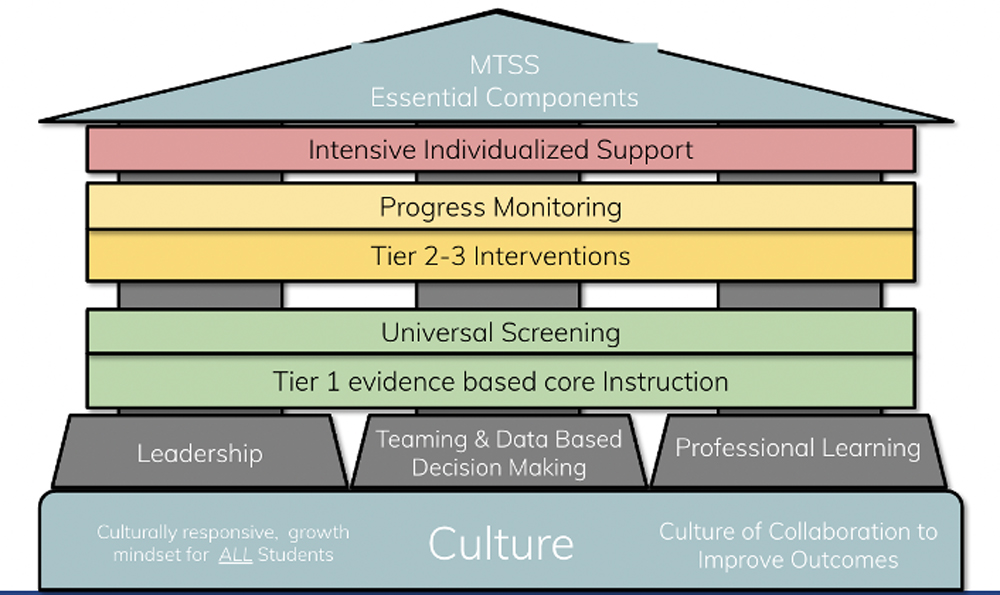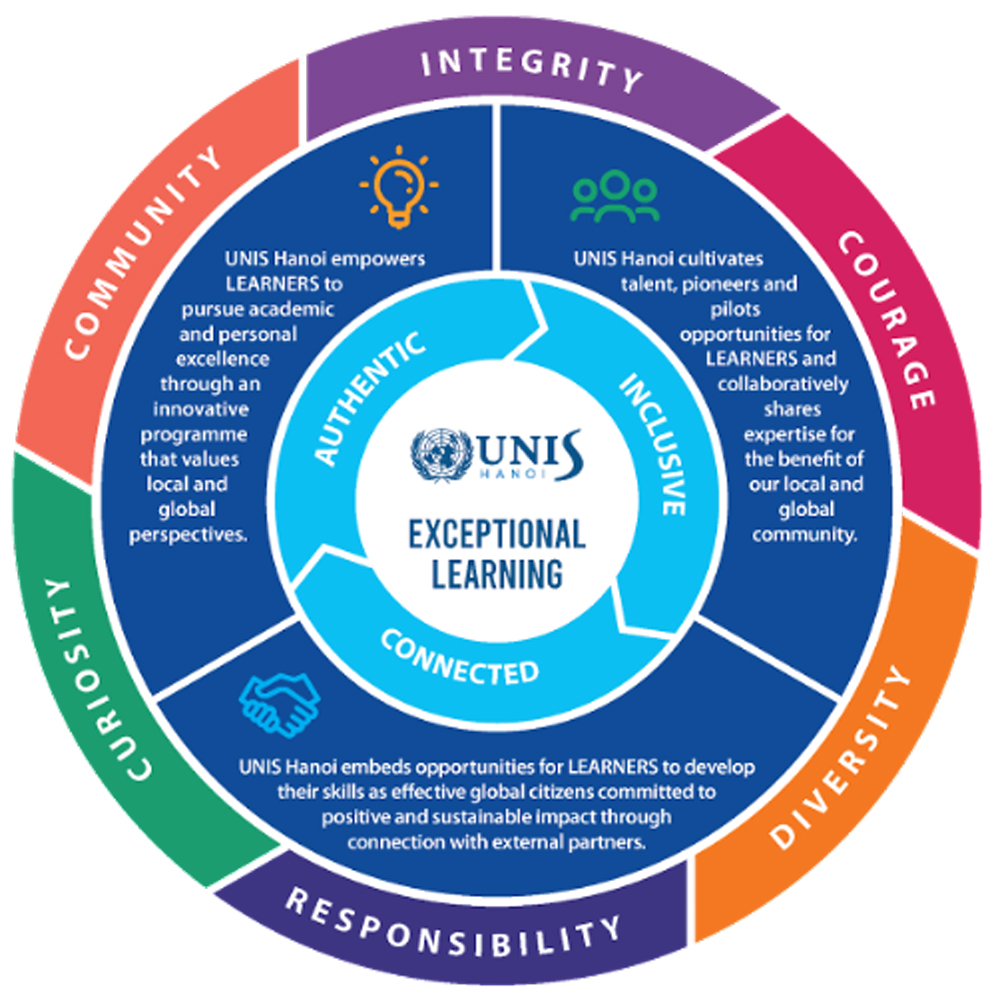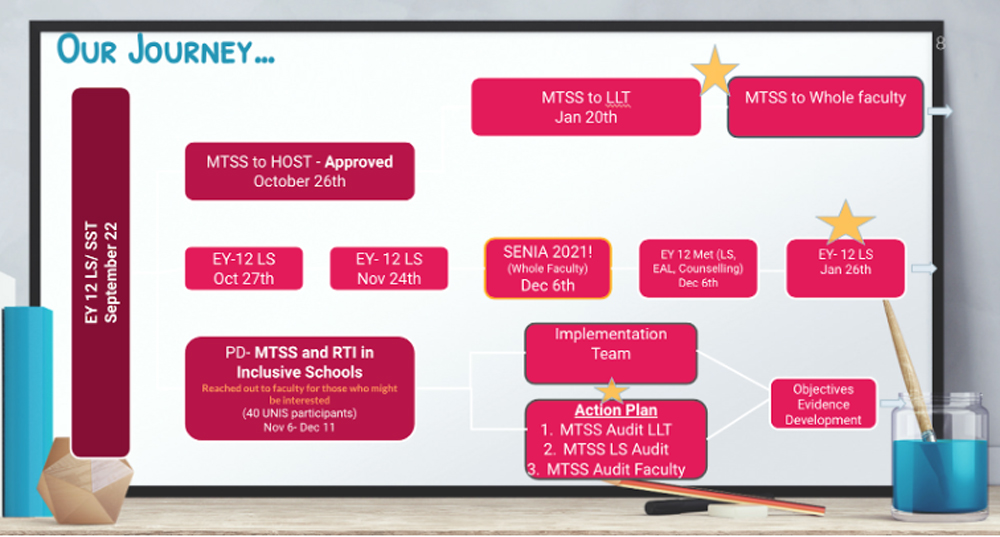
(From left to right) Nitasha Crishna and Cheryl Hordenchuk with (on-screen) Johanna Cena presenting MTSS to the UNIS Hanoi faculty. (Photo source: Nitasha Crishna)
--------------------------------------------------------------
It was a hot day in April 2021 when educational leaders, Cheryl Hordenchuk and Nitasha Crishna, at the United Nations International School (UNIS) in Hanoi, first met with the student success team from across the school. While they knew that their team consisted of committed and experienced professionals, they quickly learned that they first needed work on articulating a shared vision and common understanding of how UNIS approached success for every student at UNIS Hanoi before the school could move forward.
As the world continues to navigate the repercussions of the COVID-19 pandemic, the importance of inclusive educational practices in international schools has become more critical than ever before. Cheryl and Nitasha saw this firsthand as their students and staff came back to in-person learning. Collaborating with Lead Inclusion consultant, Johanna Cena, they took a closer look at how multi-tiered systems of support (MTSS) could help to create a more inclusive culture of care and belonging so that all students could get the support they need. According to the Center on MTSS at the American Institute on Research, “MTSS is a proactive and preventative framework that integrates data and instruction to maximize student achievement and support student’s social, emotional, and behavior needs from a strengths-based perspective.”

Over the 2021-22 school year of distance learning and school closures, Nitasha and Cheryl engaged in leading the schoolwide student success teams, composed of the learning support teachers, the speech learning pathologist, and the school psychologist, and centered around helping the team work with a schoolwide perspective. They were guided by UNIS’s strategic directions which focused on an alignment of systems, their commitment to inclusion and neurodiversity, and promoting the wellness of all members of the community.

Much of Nitasha and Cheryl’s leadership during this long and challenging year online was ensuring that the virtual meetings had time for people to connect, that they used the capacity and strength of team members to have generative conversations, and then intentionally broke the work up into small manageable chunks. They knew the cognitive and the emotional load was heavy and, as leaders, they were very aware of the pace and balancing the needs of the team.

Yearly overview from the proposal to the adoption of MTSS as a school. (Photo source: UNIS Hanoi)
A significant outcome of their work together was the recommendation to their senior leadership team that the school adopt the MTSS framework for the school. This recommendation stemmed from the six-week professional development that a group of 45 cross-divisional faculty members engaged in to learn the elements of MTSS. The professional development was facilitated by Johanna Cena. Nitasha and Cheryl could see how having a systems-based approach to creating the right conditions for MTSS would be most beneficial.
Once approved by the senior leadership team, Nitasha and Cheryl got busy creating and writing an action plan. Working with the elementary and secondary team leaders and capitalizing on the wealth of expertise with MTSS in the UNIS faculty, they co-created an action plan to support the implementation of MTSS over three years.
UNIS Journey Continued…Professional Learning Design for All
A critical component of the action plan was to provide a schoolwide MTSS course for all staff. Cheryl and Nitasha reached back out to Johanna and in the fall of 2022, UNIS launched a schoolwide MTSS courses for all staff: assistants, specialists, teachers, and leaders. The course was implemented over a six-month period of monthly online meetings and asynchronous learning between sessions. The model emphasized the shared belief that all students are our students and focused on creating a shared culture and understanding of inclusive practices through MTSS. Throughout the course, staff collaborated in a variety of different group structures and sizes across departments, grade levels, and divisions both online and in person. It was important to create a space for staff to ask questions, understand multiple perspectives, and clarify ideas after each session by using a shared document which then drove adjustments to subsequent sessions and school documentation.
One of the foundational features of this model was the importance of providing time for all faculty to define common key terminology together and develop a UNIS Hanoi terminology document accessible in Vietnamese and English. The definitions document ensures that all of the work UNIS does is now front-loaded with clarity around what the different technical vocabulary means. This was one of the big successes of the work. According to a UNIS teacher, “The definitions were a wonderful piece of the puzzle that pulled so much together for me.”
Another key element and success of the program design was providing prompts, tasks, and collaborative time for teams to work on developing shared tools and resources for MTSS implementation catered to the needs of UNIS Hanoi. In these conversations, staff explored ideas around effective universal tier one instruction, data-based decision-making, problem-solving, and intervention support. From these collaborative conversations came the creation of a school-wide behavior matrix also co-written by all faculty. The behavior matrix was created by all teachers inputting what acceptable expectations of behavior look like and after several iterations, has evolved into articulated behavior expectations from the early years to Grade 12.
Having had the opportunity to have the entire faculty contribute to these foundational resources has meant that it belongs to everyone. The intentional program design continued to balance the big understandings of schoolwide MTSS and each faculty member’s role in the system which helped to build a strong MTSS foundation.
What We Learned
As leaders, it can be challenging to meet the professional learning needs of all staff. One of the key successes of this experience was the rich collaborative planning between Johanna, Nitasha, and Cheryl. They had clear outcomes, open communication, and the flexibility to adjust to the needs of the staff. Because all staff attended over the course of multiple sessions, this was a transformative professional learning experience for the school. However, one important takeaway was the reminder that “less is more.” Asking staff to complete learning modules between sessions took away from the motivation and cohesion of the learning experience. The power of the learning was in the dialogue among staff.
Nitasha and Cheryl learned that leading UNIS in articulating a shared vision and common understanding of MTSS is challenging work but approaching professional learning from the same inclusive mindset that educators aspire to for students empowers all staff to feel valued, connected, and invested in a system that best supports all students.
References
https://mtss4success.org/essential-components
--------------------------------------------------------------
Cheryl Hordenchuk is the high school deputy principal at UNIS Hanoi.
Johanna Cena is the director of learning at the International School of Barcelona.
Nitasha Crishna is the deputy principal of the elementary school at UNIS Hanoi.